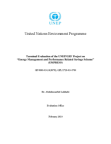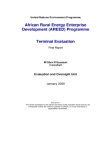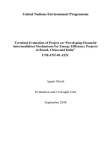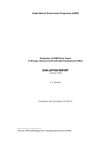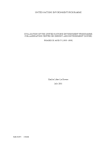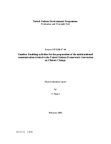The Energy Management and Performance Related Savings Scheme (EMPRESS) project aimed at the promotion of industrial energy-efficiency using Monitoring and Targeting (M&T) as an energy management tool to save energy and reduce emissions of greenhouse gases.
UNEP
African Rural Energy Enterprise Development (AREED) Programme
The purpose of AREED programme was to develop new sustainable energy enterprises that use clean, efficient, and renewable energy technologies (RET) to meet the energy needs of under-served populations in rural and periurban areas, while reducing the environmental and health impacts related to cur
Developing Financial Intermediation Mechanisms for Energy Efficiency Projects
The three country energy efficiency project (3CEE project) or Developing Financial Intermediation Mechanisms for Energy Efficiency Projects intended to achieve major increases in energy efficiency investments by the domestic financial sectors in Brazil, China and India, the three largest economie
Promoting Industrial Energy Efficiency through a Cleaner Production/Environmental Management System Framework
The project objective is to reduce the emissions of carbon dioxide by improving energy management practices and indentifying investments in SMEs through a structured approach.
UNEP Riso Centre on Energy, Climate and Sustainable Development (URC) - formerly UCCEE Phases 5 and 6
During 2000-2004, URC implemented 39 projects worth US$ 29.2 million. Its research activities generated 181 published and 134 unpublished outputs, consisting of policy studies, planning tools, analytical techniques, information packages and data bases.
Enabling Activities for the Preparation of Initial National Communications Related to the UNFCCC - Turkmenistan
The Turkmenistan State Commission on Climate Change was established in April 1997. In May 1999, the State Commission of Turkmenistan for Ensuring Compliance with Commitments under United Nations Conventions and Programmes on Environmental Protection was established.
UNEP Collaborating Centre on Energy and Environment (UCEE) - Phase 3 and 4
An evaluation mission assessed the overall pe rformance of the United Nations Environment Programme Collaborating centre for Energy and Envi ronment (UCCEE) in Roskilde, Denmark, from 1995 to 1999 and made recommendations for improvements in the scope, organization and quality of the centre’s w
Enabling Activities for the Preparation of Initial National Communications Related to the UNFCCC - Zambia
The evaluation starts by introducing Zambia's national circumstances. Its economy is based on copper mining, which accounts for over 95 per cent of its foreign exchange earnings.



